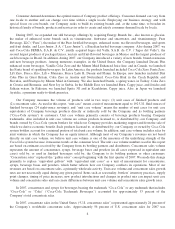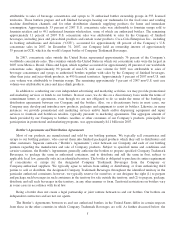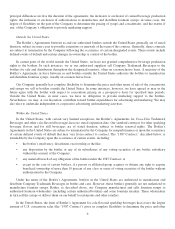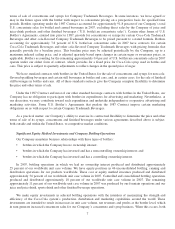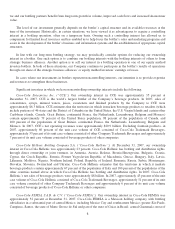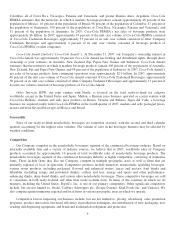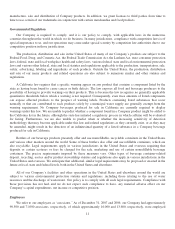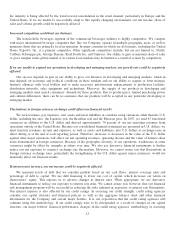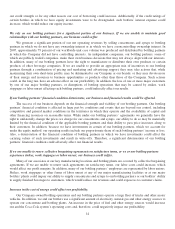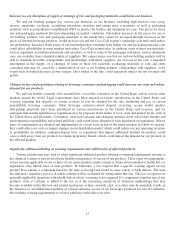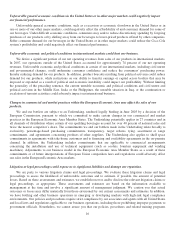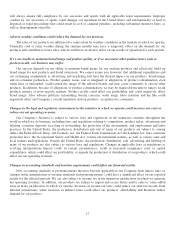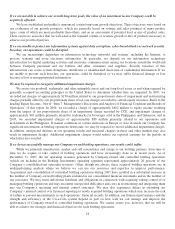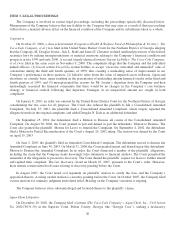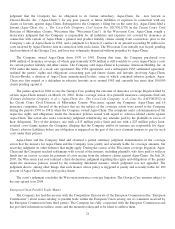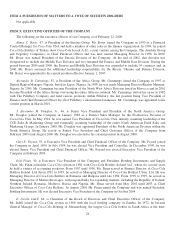Coca Cola 2007 Annual Report Download - page 16
Download and view the complete annual report
Please find page 16 of the 2007 Coca Cola annual report below. You can navigate through the pages in the report by either clicking on the pages listed below, or by using the keyword search tool below to find specific information within the annual report.our credit strength or for any other reason, our cost of borrowing could increase. Additionally, if the credit ratings of
certain bottlers in which we have equity investments were to be downgraded, such bottlers’ interest expense could
increase, which would reduce our equity income.
We rely on our bottling partners for a significant portion of our business. If we are unable to maintain good
relationships with our bottling partners, our business could suffer.
We generate a significant portion of our net operating revenues by selling concentrates and syrups to bottling
partners in which we do not have any ownership interest or in which we have a noncontrolling ownership interest. In
2007, approximately 79 percent of our worldwide unit case volume was produced and distributed by bottling partners
in which the Company did not have controlling interests. As independent companies, our bottling partners, some of
which are publicly traded companies, make their own business decisions that may not always align with our interests.
In addition, many of our bottling partners have the right to manufacture or distribute their own products or certain
products of other beverage companies. If we are unable to provide an appropriate mix of incentives to our bottling
partners through a combination of pricing and marketing and advertising support, they may take actions that, while
maximizing their own short-term profits, may be detrimental to our Company or our brands, or they may devote more
of their energy and resources to business opportunities or products other than those of the Company. Such actions
could, in the long run, have an adverse effect on our profitability. In addition, the loss of one or more major customers
by one of our major bottling partners, or disruptions of bottling operations that may be caused by strikes, work
stoppages or labor unrest affecting such bottling partners, could indirectly affect our results.
If our bottling partners’ financial condition deteriorates, our business and financial results could be affected.
The success of our business depends on the financial strength and viability of our bottling partners. Our bottling
partners’ financial condition is affected in large part by conditions and events that are beyond our control, including
competitive and general market conditions in the territories in which they operate and the availability of capital and
other financing resources on reasonable terms. While under our bottling partners’ agreements we generally have the
right to unilaterally change the prices we charge for our concentrates and syrups, our ability to do so may be materially
limited by the financial condition of the applicable bottling partners and their ability to pass price increases along to
their customers. In addition, because we have investments in certain of our bottling partners, which we account for
under the equity method, our operating results include our proportionate share of such bottling partners’ income or loss.
Also, a deterioration of the financial condition of bottling partners in which we have investments could affect the
carrying values of such investments and result in write-offs. Therefore, a significant deterioration of our bottling
partners’ financial condition could adversely affect our financial results.
If we are unable to renew collective bargaining agreements on satisfactory terms, or we or our bottling partners
experience strikes, work stoppages or labor unrest, our business could suffer.
Many of our associates at our key manufacturing locations and bottling plants are covered by collective bargaining
agreements. If we are unable to renew such agreements on satisfactory terms, our labor costs could increase, which
would affect our profit margins. In addition, many of our bottling partners’ employees are represented by labor unions.
Strikes, work stoppages or other forms of labor unrest at any of our major manufacturing facilities or at our major
bottlers’ plants could impair our ability to supply concentrates and syrups to our bottling partners or our bottlers’ ability
to supply finished beverages to customers, which would reduce our revenues and could expose us to customer claims.
Increase in the cost of energy could affect our profitability.
Our Company-owned bottling operations and our bottling partners operate a large fleet of trucks and other motor
vehicles. In addition, we and our bottlers use a significant amount of electricity, natural gas and other energy sources to
operate our concentrate and bottling plants. An increase in the price of fuel and other energy sources would increase
our and the Coca-Cola system’s operating costs and, therefore, could negatively impact our profitability.
14


